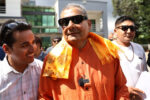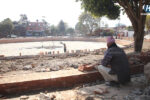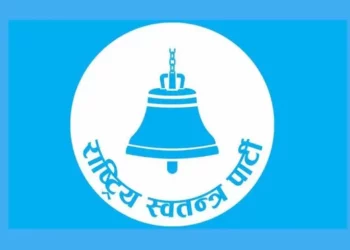After the establishment of diplomatic relations between Nepal and Finland in 1974, bilateral relations between the two nations have been marked by cordiality, friendship, and cooperation. Finland has been assisting Nepal in several areas such as water and sanitation, education, poverty alleviation, gender equality, among others. The relations between the two countries are based on mutual cooperation and a shared commitment to grow together. Ishwar Dev Khanal of Khabarhub talked to Mr. Pertti Anttinen, the Ambassador of Finland to Nepal, at the office of Khabarhub on various range of issues. Excerpts:
It’s been around 45 years that Nepal and Finland have established their diplomatic relations. How do you analyze Nepal-Finland relations?
Indeed, it’s been quite a long time since the establishment of diplomatic relations between the two countries. The Embassy of Finland in Nepal has been in operation since 1992. So, we have ensured our physical presence through the Embassy of Nepal for the last 27 years. The reason why we are here proves that we value the cooperation between the two countries and want to take it at a much higher level. Finland considers Nepal as one of its long-term development partners. This constitutes the building blocks of our mutual relations which have continued without break from the past till today in the present. Finnish projects, in fact, not only support improved sanitation and access to clean drinking water in Nepal but also empower rural communities, including girls and women.
Both Finland and Nepal are going much beyond to another level of friendship as the political partnership is much stronger today than what it used to be in the past. For instance, we signed a Memorandum of Understanding (MoU) just recently for having regular consultations between Finland and Nepal at the political level. The two countries will hold regular consultations in Kathmandu and Helsinki alternatively to identify new areas of cooperation and issues of mutual interest. It is very essential to discuss what’s happening all around the world and come out together the global agenda where we can cooperate with each other. We share many things together in common. A number of Finnish tourists visiting Nepal are going up every passing year. I must tell you that Nepal has a very good image in Finland. Moreover, the number of Nepalese people living in Finland is growing every year. A number of Nepali students are opting Finland for their higher studies and their presence is on the rise. Coming to trade between the two countries, I am hopeful trade, though very little at the moment, will rise in the coming years. Yes, of course, the trading potential between the two countries is very high in the future.
What is the list of Finland’s priority in Nepal at the moment?
Development cooperation is the priority area topping the list. The partnership between Finland and Nepal is for all time peace …. It is the peace partnership working to establish something which gives us a reason to be in Nepal. Through several sponsored programs in line with our priorities, we are working in three vital sectors. The first sector is water and sanitation where we are with the help of money, technology, and expertise supplying clean water to hundreds and thousands of people especially in rural Nepal through our programs. The second sector is education popularly known as ‘school sector development program’ in Nepal. And, the third sector we are working at is the area of gender equality. I also wish to mention here that since Finland is currently the EU Council presidency, our theme here is actually gender-equality to advocate the issue of gender equality and empowerment of women and girls’ rights. This means that we promote the underprivileged communities’ right to water and sanitation, education and access to decision-making and service delivery.
Quite a significant number of Finnish civil society organizations are working in Nepal to support the government’s programs. How do you rate their contribution?
There are currently 17 Finnish NGOs that contribute and support their local partners through the funding of the Finnish government. It is quite a big number. This clearly shows the interest of the Finnish people. The NGOs are doing a great job here as they are working in contributing to social development areas such as health care, education, livelihood, women economic empowerment, gender equality, and several other sectors.
Can Nepal expect any new Finland-funded projects or investments in the near future?
Well, in terms of investments as such, yes there are some areas which we need to study in detail. Let me inform you that Finland has made an investment in hydropower sector through International Finance Corporation (IFC). We have a special fund for climate-friendly investment which we are planning to invest here in Nepal after Trishuli I hydro project. We are putting around 13 million dollars on the hydroelectric power plant to be built in the Trishuli River through IFC special fund. In fact, we are hopeful to make more investment in Nepal. However, we need to see the FDI climate here as well as the supportive conditions provided by the Government of Nepal to attract Foreign Direct Investment, which is very crucial for all of us.
The Government of Nepal has assured of providing a conducive environment, including hassle-free bureaucratic passage to accept FDI. What is the problem then?
Indeed, we are studying that. We welcome the government’s steps and the commitments shown to attract FDI. However, I think there are still some areas, however, we still wait for the legislation and the regulations to be completed. To be frank, we are happy to hear such commitments from the government’s side.
Nepal is observing Visit Nepal Year 2020, an ambitious campaign to attract around 2 million tourists. Is Finland keen to send more tourists to Nepal?
In fact, it is the task of the Nepal government to initiate promotional programs to bring in more tourists. Obviously, we are very supportive. We have been providing information through our embassy websites. In fact, the number of Finnish tourists has been increasing every year.
How do you see the development process and its diversity in Nepal since you joined as the Finnish Ambassador here in August 2018?
Well, my experience in Nepal is quite short, less than a year. But what I am reading and learning is that obviously, poverty reduction has been successful in the last ten years. Nepal has succeeded to reduce the absolute poverty from more than 40 percent to 20 plus percent at the moment. It is a significant reduction in a limited time frame. Obviously, Nepal’s geography, for instance, is very challenging. There is still poverty prevalent in the remote parts of the country; there have been instances of labor migration owing to lack of job opportunities in some of the rural communities. There are infrastructural challenges still waiting to be taken up headlong. I think the private sector needs to play a much bigger role to generate employment opportunities by establishing more companies and industries in the country which will discourage young people from flying overseas for employment. I would say that youths are Nepal’s big assets which the country should not lose.
What are the outstanding developments that have taken place in the area of maintaining people-to-people relation between the two countries?
Well, first of all during our development cooperation in all these years, I am amazed to see several experts, government officials, civil society members have visited Finland. The number is quite big. We have different kinds of cooperation modalities, for instance, training between universities, government institutions, and other sectors. People to people contact is also increasing as Finnish tourists are visiting Nepal. I would say that the distance between the two countries is shrinking.
What is the role of your Embassy in promoting gender equality in Nepal?
We have two concrete programs currently going on under the UN women program with government and stakeholders participating in it. The program is aimed at building economic empowerment amongst the Nepalese women through several activities under the sponsored program. We support any projects such as water and sanitation work, women’s participation in decision making in communities and others which directly help to improve the quality of life of Nepalese people.
And, of course, our projects have supported, as I said earlier, improved access to clean drinking water in rural areas of the far-west region of Sudhurpaschhim Province. Among the six hundred thousand who have been benefitted from our projects, half of them are women and girls. Just imagine, how much of their time has been saved when they do not have to travel long distances for fetching drinking water from rivers. It has made a big impact on women’s life. The same is in the health sector.
Also, we are promoting gender equality in Nepal and advocating for women empowerment – be it economic or political empowerment. I really need to recognize the efforts of the government of Nepal in this area of empowering women and ensuring their representation in all sectors. This is really commendable. Finland has also helped Nepal to draft its Security Council 1325 Action Plan. What is equally important is to realize that the issue of gender equality is not important only for women but is equally important for men too. For instance, the part of the Finnish success story is that despite having limited resources and population, Finland ensures women participation in political decision making. In fact, we provide equal opportunities to both women and men. Equality is one of the key elements for the success of Finland. That’s why, we rank at the top three or five in all sectors such as rule of law, competitiveness, among others.
Excellency, you come from a country like Finland. How do you analyze Nepal’s political situation?
In fact, what I learned is that the political situation is very unique in Nepal’s context, which is something that really provides a chance to understand many things. Political stability is one of the key elements for a country’s development and prosperity. I think the incumbent majority government would provide a lot of opportunities to people. We are keen to see how things are evolving here and how the government implements the policies.
How is your stay in Nepal?
Well, I think, Nepal has treated me and my wife very well. This is for me the first time to work in Nepal and in this region. I have worked in other countries. This is a new region for me and I am learning new issues almost every day because Nepal has a very rich culture, long history, beautiful landscape, biodiversity, and also cultural diversity. I am still very enthusiastic about being here in Nepal. My learning curve is still going on.









Comment